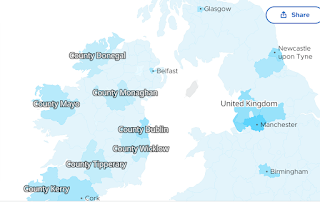 |
| Margaret Graham Blake |
Dwight, grandson of Margaret Graham Blake, wrote the following after getting the results back on our cousin Joe's Y-DNA (R-M269). Y DNA traces the paternal line back for many generations. We were surprised to see that we match Henry and Thomas Parks DNA---we were expecting Graham or Grimes (they are both the same name---just spelling differences). So, Dwight went back to the autosomal DNA results we had gathered from about 12 William Graham descendants using primarily GEDmatch. Autosomal or atDNA analyzes all of a person's DNA but only goes back 5 generations accurately. What we wanted was information on7 generations back. To do that with atDNA, we had to lower threshold from 7cM to 4cM and we could only do that on GEDmatch. We were able to find several among the dozen of William Graham's descendants who were able to match Henry Parks and Henry Grimes family members barely below the 7cM threshold and several above that threshold. For more on DNA and genealogy, click here.
 |
| For more on R-M269, click here |
"I think just Y chromosome test, and tables showing correlation of us with Henry Parks and with John Grimes... we then learn three things.
- Our Y chromosome matches that of Henry Parks (b.1758 in Albermarle County). Henry Parks Y chromosome is a sub-variant type of that for the other Parks of Albermarle County. It can not be conclude that Henry Parks is a male descendant of the Thomas Park family of Albermarle, as the difference in Y chromosomes has about 8 mutations. But, he did migrate with the family of Thomas Parks to Wilkes County NC, after his birth.
- The atDNA analysis of our WmGraham group compared to 4 Henry Parks descendants shows high cM correlation values for that many generations back. This is consistent with the data demonstrating the matching of our Y chromosome to that family
- The atDNA analysis of our WmGraham group with the descendants of John Grimes (b. 1758, Hannover County VA) shows an equally high, if not higher, cM correlation value. John Grimes, and his brother Henry Grimes, obtained early land Patents in Washington County TN, along with our James [Graham], in 1777. Our family name Graham probably comes from this family. John and Henry Grimes are known sons of Capt. William Grimes (with his 1st wife). Captain William Grimes was killed in the Service of our young Country in Philadelphia in July 1777, under the command of General Washington.









